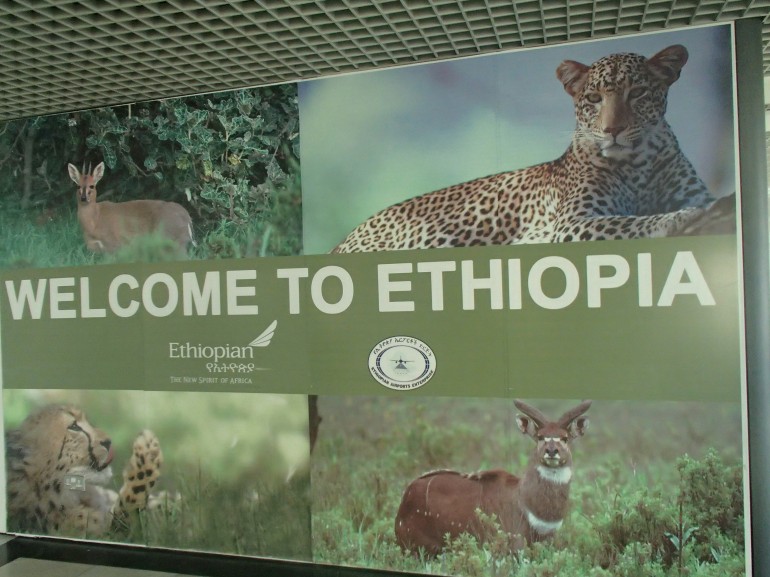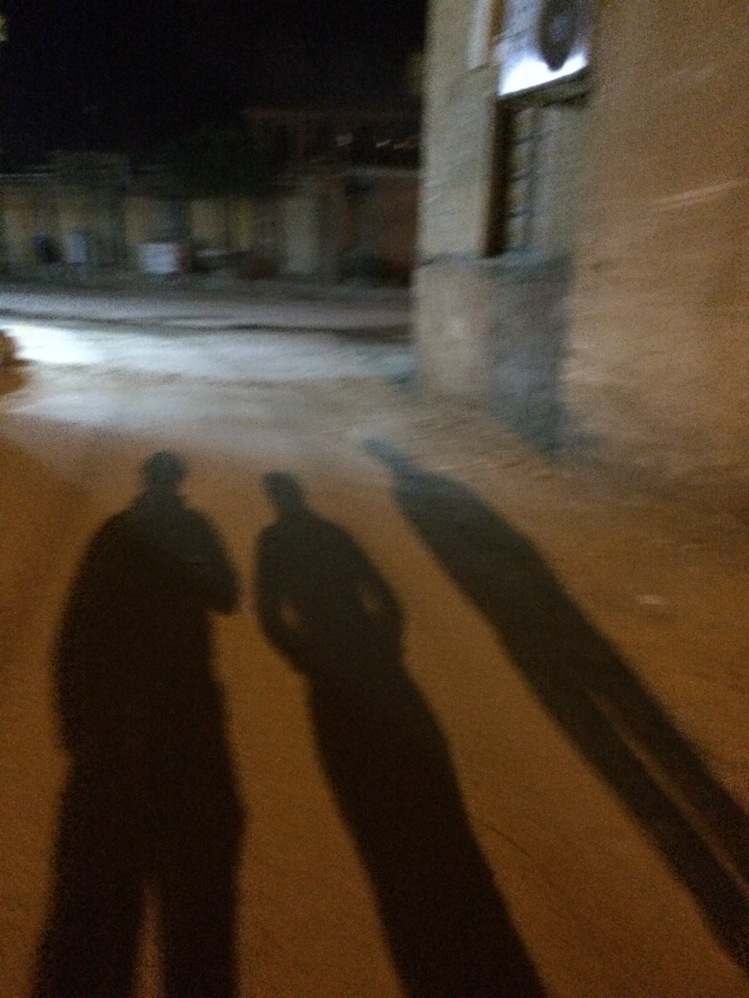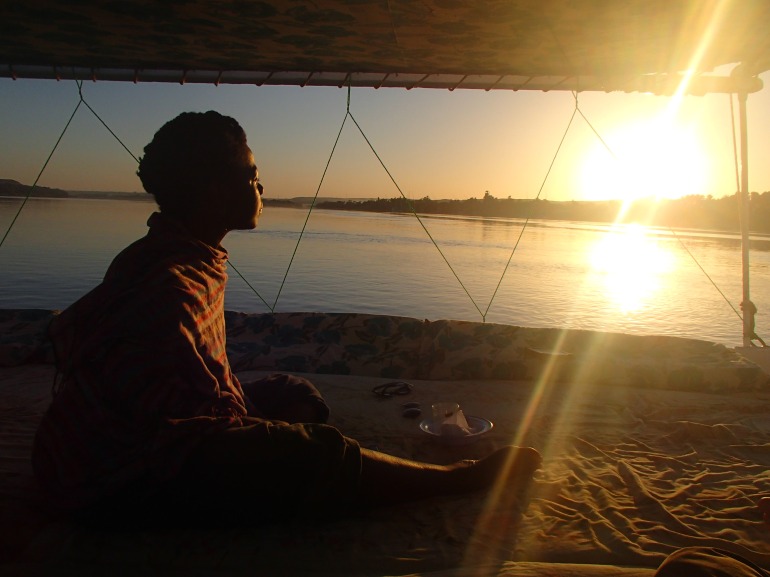We are in Ethiopia, a land of unimaginable natural beauty where the people have a pride in their culture that I had never seen before.
First there was Addis Ababa, the capital. We entered Addis with a list of demands.
- Find a place to stay
- Purchase an Ethiopian phone card
- Get typhoid and meningitis vaccinations and malaria pills
As mentioned previously, I lost our only working cell phone (Mat’s) on our last 10 hour bus ride in Egypt. Luckily, we still had my phone. But after buying an Ethiopian phone card, we realized that my phone was locked! So we had to go through the process of contacting my carrier to request a code to unlock my phone. In a country where internet connections are shoddy even when you pay for them, it took a whopping 3 days of making countless failed attempts to make a successful international call.
The second order of business was getting vaccinations and malaria pills. The prices for these vaccinations in the states are astronomical but in other countries we can get them for less than $20. I already got a yellow fever shot in Cairo, so I’m a pro at getting shots in foreign African countries! Don’t worry. The vaccines come in sealed packages so we always know they are legit. I would love to say that this is a simple process, but finding a clinic that offers these vaccinations takes the larger part of a day.
Somewhere in the middle of all this “business handling” we met Ras, the guy who would become our main man in Addis. Walking down the street on our first day, I pointed to a poster for a jazz concert. Mat and I stopped to look and there appeared Ras.
“Do you want to see that?,” he said.
“Yeah, but…” I replied, trying to find a way to avoid a conversation.
We’ve been traveling long enough to know that 9 times out of 10 when someone approaches you on the street, chances are they want money. He began to tell us that he’s a musician and he knows the band. Is he trying to sell us tickets?
Soon he’s walking with us and the next thing we know he’s taking us to a place to buy our phone card. He explains the process to us and helps us make a smart purchase. We’ve learned that in Ethiopia many places charge faranji prices; that is, higher prices for foreigners who they call faranjis. This is very frustrating for people traveling on a budget, like us. Having a local with you when you make any purchase (or even order at a restaurant) can save you some bucks.
Even so, our guard is still up. What does he want? Why is he still here?
He notices that our guard is up. He tells us that he doesn’t want any money, that he’s our friend.
It’s not until he tells us that he’s a couchsurfer that it all makes sense: His friendly, open manner; the way he willingly gives his time and constantly insists that “it’s no problem” are a dead giveaway. We finally let our guard down. It seems that the travel gods have brought another angel our way.
Ras also takes us all around town the next day looking for a clinic that offers the vaccinations we need. He translates for us and takes us to 3 different clinics (1 which has been razed to the ground) and a pharmacy until we finally get our malaria pills and our meningitis shot (no luck with typhoid).
After all of our “business handling” we take some time to enjoy the city. Addis Ababa is not what you see at first glance. At first glance, one sees a sprawling city with hills that remind you of San Francisco; broken sidewalks with gaping holes; abandoned buildings and long stretches of corrugated tin walls painted yellow, green, and red; countless disabled or homeless people on the streets; barefoot children selling gum; and areas of construction work that seem like they’ll never be complete. People don’t seem even remotely pleasant. As in most cities, the average person is just trying to get where they’re going. But in addition to this normal city vibe, people occasionally stare at us openly. I wonder if I’ll ever let my guard down.
Then, one night Ras takes us to see some traditional Ethiopian song and dance and we finally see another side of the city. First Ras takes us to a large, beautifully decorated restaurant, with a prominent stage, filled with groups of tourists. On the stage a dance group of 4 men and 4 women in traditional Ethiopian attire is dancing to music played by a 5 piece band. Their dancing is full of energy with quick light jumps and a type of shoulder jerk that I’d never seen in my life. They jerk their shoulders and their chests so powerfully and quickly that they seem to not be attached to their bodies. They come into the audience to get people on their feet and to try the peculiar shoulder dancing. Locals join on stage when the spirit hits them. A group of Japanese girls all dressed in the same outfit get on stage and tear it up. We’re all surprised at how quickly they get the moves. The dancers come to our table and we each get up and have a turn at the shoulder moves. Everyone is having a good time.
During the show the dancers leave the stage periodically and we just listen to the band, which is sometimes joined by various singers who sing songs from the different regions and tribes of Ethiopia. Each time the dancers return they are in different attire signifying the region and tribe of the dance they will perform. It blows my mind that these dances have been preserved and are danced by young people who are perceptibly proud of them.
Soon we are ready to go and Ras decides to take us to a less touristy place. We are curious about how most locals experience their traditional song and dance outside of a huge tourist spot.
We arrive at a small dimly lit club. The floors are cement and there is grass strewn all over them for decoration. There is no stage. There is no amplified sound. The singer walks through the tables singing in the particular traditional Ethiopian style. It is a rich sound that seems like a type of moaning punctuated with high, belting pitches. It is kind of like the blues and kind of like Irish folk singing. It is amazing.
The rhythms of the drum and the melody of the single stringed masinko are infectious. Soon people stand at their tables and dance moving their shoulders in that quick jerk. There is a small dance group that does the traditional regional dances and comes to the tables to dance with people for tips. It is difficult to keep up with the complex rhythms of their dancing. Each move seems to begin between a beat, catch up with it, slow down again, and then surpass it. The energy of this small club is palpable. Locals, mostly young people, seem to come here to enjoy themselves but to also feed their souls. It seems like a spiritual experience. I sip tej (Ethiopian honey wine) out of what looks like a beaker and am lulled into the experience.
When the night is over, we wonder what hit us. Who is Addis Ababa? Yes, the city suddenly seems like a person. He is mysterious and enigmatic, hard to capture. And before you know it, he has pulled you into his web. He has an unexpected charm and a glow you only find in the quiet moments between the noise.

Modern looking buildings, people dressed in Western clothing, and donkeys in the street. The contradictions are endless. Who is Addis Ababa?






















































